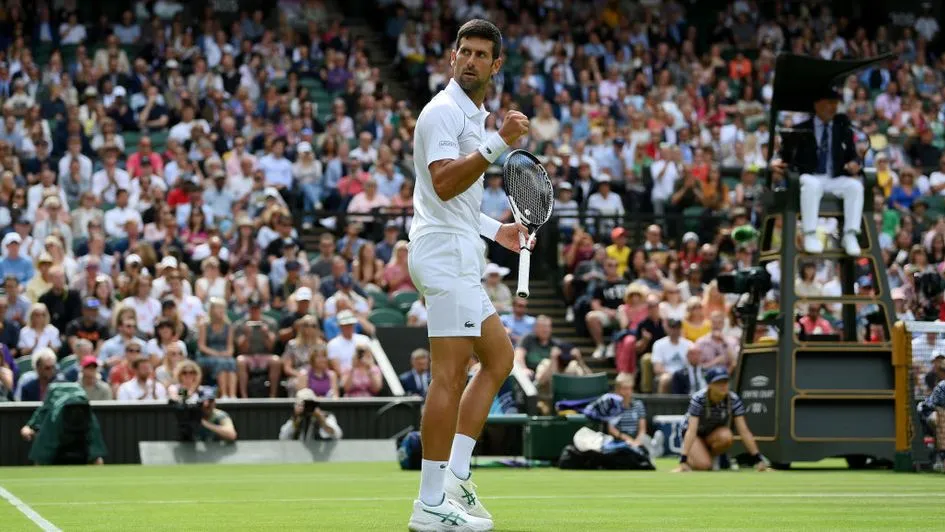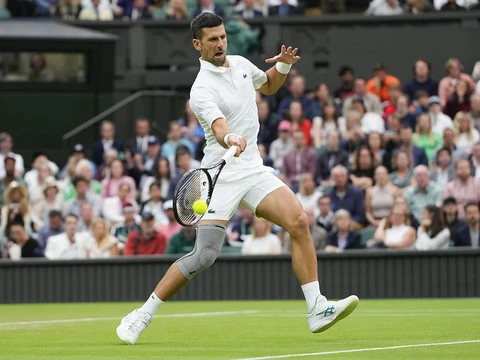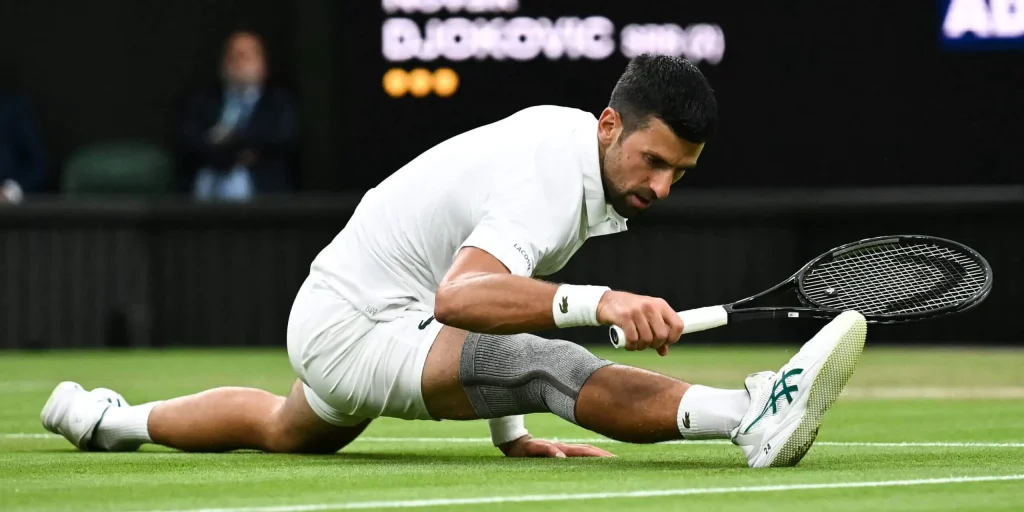
Table of Contents
- Introduction
- Early Life and Background
- Professional Career
- Playing Style and Techniques
- Training and Fitness Regimen
- Personal Life
- Injuries and Challenges
- Legacy and Impact on Tennis
- Controversies and Public Perception
- Future Prospects
- Fan Base and Cultural Impact
- Comparisons with Other Tennis Legends
- Conclusion
- FAQs
Introduction
Novak Djokovic, a name synonymous with excellence in the world of tennis, has carved out a remarkable career filled with historic achievements and unforgettable moments. This comprehensive guide delves into the life and career of Djokovic, exploring his early beginnings, professional milestones, playing style, personal life, and much more. Known for his relentless pursuit of greatness and unwavering dedication, Djokovic’s journey offers a fascinating insight into what it takes to be one of the greatest tennis players of all time.
To follow Djokovic’s matches and other tennis events live, you can use the IPTV service “Tvshow4k.” All tennis events are available to watch on Tvshow4k.com, providing you with an uninterrupted viewing experience.
Early Life and Background
Novak Djokovic was born on May 22, 1987, in Belgrade, Serbia, then part of Yugoslavia. Growing up in a war-torn country, Djokovic’s early years were marked by adversity. However, his family’s support and his innate talent for tennis shone through these challenging times. His parents, Srdjan and Dijana Djokovic, were integral to his development as they recognized his potential from a young age.
Djokovic started playing tennis at the age of four, influenced by his parents and coached by Jelena Gencic, who famously predicted that he would become the world’s number one player. Djokovic’s early dedication and passion for the sport were evident as he trained rigorously, often under challenging conditions, which built a strong foundation for his future success.
Professional Career
Turning Professional
Turning Professional: Djokovic’s Early Career Journey
Novak Djokovic turned professional in 2003 at the age of 16, a pivotal moment that marked the beginning of an extraordinary journey in the world of tennis. His transition from a promising junior player to a professional was both swift and impressive, showcasing his immense talent and dedication to the sport. To understand the significance of this transition, it is essential to delve deeper into the early years of his career, the challenges he faced, and the milestones he achieved along the way.
Early Influences and Beginnings
Djokovic’s early exposure to tennis was significantly influenced by his family and environment. Growing up in Serbia, his parents, Srdjan and Dijana, recognized his potential at a young age and provided unwavering support. His early coaching under Jelena Gencic, a renowned tennis coach who had previously worked with other tennis legends, was instrumental in shaping his foundational skills. Gencic’s training emphasized not only technical proficiency but also mental toughness, a characteristic that would become a hallmark of Djokovic’s playing style.
Junior Career Highlights
Before turning professional, Djokovic had an illustrious junior career that hinted at his future success. He played in various international junior tournaments, where he showcased his talent and competitive spirit. His performances in these tournaments were characterized by remarkable consistency and resilience, often outplaying older and more experienced opponents. These experiences on the junior circuit were crucial in building his confidence and honing his skills for the professional stage.
Transition to Professional Tennis
In 2003, at just 16 years old, Djokovic made the bold decision to turn professional. This move was not without its challenges. The world of professional tennis is fiercely competitive, and young players often struggle to establish themselves amidst seasoned veterans. However, Djokovic’s transition was remarkably smooth, a testament to his preparation and innate ability.
Early ATP Tournaments and Breakthroughs
Djokovic’s early professional career was marked by participation in several ATP tournaments, which provided him with the exposure and experience needed to compete at the highest levels. His initial performances were promising, and he quickly began to make a name for himself on the ATP Tour.

First ATP Main Draw Appearance
One of Djokovic’s first significant milestones as a professional was his ATP main draw debut at the Umag Open in Croatia in 2004. Although he did not advance far in the tournament, his participation was a crucial step in gaining experience and understanding the demands of professional tennis. Competing against higher-ranked players, Djokovic displayed flashes of brilliance that would become more consistent with time.
Climbing the ATP Rankings
As Djokovic continued to participate in various ATP events, his game evolved, and his ranking steadily improved. In 2005, he made his debut in all four Grand Slam tournaments, a significant achievement for any young player. While he did not progress past the early rounds, the experience gained from competing on such prestigious stages was invaluable. Each match, win or lose, contributed to his growth as a player and provided lessons that would serve him well in the future.
First ATP Title
A landmark moment in Djokovic’s early career came in 2006 when he won his first ATP title at the Dutch Open in Amersfoort. This victory was more than just a tournament win; it was a statement of his arrival on the professional scene. Djokovic defeated Nicolas Massu in the final, showcasing his versatility and ability to perform under pressure. The win boosted his confidence and proved to the tennis world that he was a formidable contender.
Consistency and Growth
Following his first ATP title, Djokovic’s career trajectory continued to ascend. He began to show remarkable consistency, regularly reaching the latter stages of tournaments. His game, characterized by exceptional baseline play, agility, and mental fortitude, started to mature. Coaches and analysts noted his ability to adapt to different playing conditions and surfaces, a versatility that would become one of his greatest strengths.
Breakthrough Grand Slam Performance
Djokovic’s breakthrough in Grand Slam tournaments came in 2007 at the US Open, where he reached the final. Although he lost to Roger Federer, his performance throughout the tournament was a clear indicator of his rising status in the tennis world. He defeated several top players en route to the final, displaying not only skill but also the mental toughness required to compete at the highest level. This performance was a precursor to his future Grand Slam successes.
Rivalries and Learning Experiences
During these formative years, Djokovic also began to develop rivalries with other top players, most notably Roger Federer and Rafael Nadal. These encounters were more than just matches; they were learning experiences that pushed Djokovic to elevate his game. Competing against such elite players highlighted areas for improvement and inspired Djokovic to work harder and smarter. These rivalries, characterized by intense and high-quality matches, would become central to his career and the broader narrative of men’s tennis.
Coaching and Support Team
A critical factor in Djokovic’s early professional success was the support of his coaching team. His relationship with Marian Vajda, who started coaching him in 2006, was particularly significant. Vajda’s expertise and understanding of Djokovic’s game played a crucial role in his development. The coach-player relationship was built on trust, mutual respect, and a shared vision of excellence. Under Vajda’s guidance, Djokovic refined his techniques, improved his physical conditioning, and enhanced his strategic approach to matches.
Overcoming Adversity
Djokovic’s journey was not without adversity. Early in his career, he faced physical challenges, including breathing difficulties that affected his performance. These issues prompted him to make significant lifestyle changes, including adopting a gluten-free diet, which he credits with transforming his health and enhancing his performance. This period of adversity and the subsequent adjustments showcased Djokovic’s determination and willingness to make necessary sacrifices for his career.
Continued Rise and Major Milestones
By 2008, Djokovic had firmly established himself as one of the top players in the world. His victory at the 2008 Australian Open, his first Grand Slam title, was a watershed moment. Defeating Jo-Wilfried Tsonga in the final, Djokovic not only showcased his physical and technical prowess but also his ability to handle the pressure of major finals. This win marked the beginning of a new era in men’s tennis, with Djokovic emerging as a serious contender for the top spot.
Establishing Himself Among the Elite
The period following his first Grand Slam win saw Djokovic continue to perform at a high level, consistently reaching the advanced stages of tournaments and competing fiercely against the best in the world. His ability to win on different surfaces and adapt his game to various conditions solidified his reputation as a versatile and complete player.
Foundation for Future Dominance
Djokovic’s early professional years laid the foundation for his future dominance in tennis. The experiences, victories, and challenges of these formative years equipped him with the skills, mental toughness, and resilience required to reach the pinnacle of the sport. His journey from a talented junior to a top-ranked professional is a testament to his hard work, dedication, and unwavering belief in his abilities.
Reflection on Early Career Achievements
Reflecting on Djokovic’s early career, it is evident that his success was not accidental but a result of meticulous planning, relentless effort, and strategic decision-making. Each step of his journey, from turning professional at 16 to winning his first Grand Slam, was marked by significant milestones that shaped his career and prepared him for future challenges.
Major Milestones and Achievements
Djokovic’s career is studded with numerous milestones and achievements. His first major breakthrough came in 2008 when he won his first Grand Slam title at the Australian Open. This victory signaled the arrival of a new force in men’s tennis.
Grand Slam Titles
Djokovic has won multiple Grand Slam titles across all four major tournaments:
- Australian Open: A record number of titles.
- French Open: Achieved the Career Grand Slam.
- Wimbledon: Multiple victories showcasing his grass-court prowess.
- US Open: Dominant performances over the years.
Record-Breaking Moments
Djokovic holds several records, including the most weeks at No. 1 in the ATP rankings. His ability to perform consistently at the highest level has set him apart from his peers.
Notable Rivalries
One of the defining aspects of Djokovic’s career is his rivalries with other tennis legends:
- Roger Federer: Their matches have produced some of the most thrilling moments in tennis history.
- Rafael Nadal: Known for their intense battles, especially on clay.
- Andy Murray: A friendly rivalry that has seen numerous high-stakes matches.
Playing Style and Techniques
Overview of Djokovic’s Playing Style
Djokovic is known for his all-court playing style, exceptional flexibility, and defensive capabilities. His ability to turn defense into offense seamlessly makes him a formidable opponent on any surface.
Signature Moves and Techniques
Backhand
Djokovic’s two-handed backhand is widely regarded as one of the best in the game. It’s not only consistent but also a potent weapon, capable of producing winners from difficult positions.
Return of Serve
Djokovic’s return of serve is another standout aspect of his game. His ability to read serves and return them with precision often puts him in an advantageous position from the very start of the point.
Strengths and Weaknesses
Strengths
- Consistency: Djokovic’s ability to maintain a high level of play throughout a match.
- Flexibility: His incredible flexibility allows him to reach and return shots that seem impossible.
- Mental Toughness: Djokovic’s mental resilience has seen him through many tough matches and comebacks.
Weaknesses
While Djokovic has very few weaknesses, his occasional vulnerability under extreme pressure and against high-risk, aggressive players has been noted.
Training and Fitness Regimen

Daily Training Routine
Djokovic’s training regimen is rigorous and meticulously planned. It includes:
- Tennis Practice: Multiple hours of on-court practice focusing on various aspects of his game.
- Fitness Training: Strength, conditioning, and flexibility exercises.
- Recovery Sessions: Importance of recovery to maintain peak physical condition.
Diet and Nutrition
Djokovic follows a strict gluten-free diet, which he credits for improving his performance. His diet is rich in vegetables, lean proteins, and healthy fats, ensuring he stays in top shape.
Mental Preparation and Focus
Mental preparation is a crucial part of Djokovic’s routine. He practices mindfulness and meditation, which helps him stay calm and focused during high-pressure situations.
Personal Life
Family and Relationships
Djokovic is married to Jelena Djokovic, formerly known as Jelena Ristic, and the couple’s enduring relationship has been a cornerstone of his personal life. They met in high school and started dating in 2005, with their relationship blossoming alongside Djokovic’s burgeoning tennis career. The couple got engaged in September 2013 and tied the knot on July 10, 2014, in a beautiful ceremony held at Sveti Stefan, a small islet and hotel resort in Montenegro. Together, they have two children: a son named Stefan, born in October 2014, and a daughter named Tara, born in September 2017.
His family plays an immensely significant role in his life, providing unwavering support and a sense of stability throughout his career. Jelena, who holds a degree in business administration and has been actively involved in various philanthropic activities, often manages the Novak Djokovic Foundation, which focuses on early childhood education in Serbia.
Their children, Stefan and Tara, are frequently seen cheering for their father at his matches, further highlighting the strong family bond. This support system has been crucial for Djokoviic, offering emotional strength and encouragement that has helped him navigate the highs and lows of his professional journey. The love and stability provided by his family have undoubtedly been a driving force behind his success, enabling him to focus on his game while maintaining a balanced and fulfilling personal life.
Philanthropy and Charity Work
Djokoviic is actively involved in philanthropy through the Novak Djokovic Foundation, which focuses on early childhood education and development in Serbia.
Hobbies and Interests Outside Tennis
Outside of tennis, Djokoviic enjoys various hobbies, including skiing, music, and reading. These interests help him unwind and maintain a balanced life.
Injuries and Challenges
Significant Injuries Throughout Career
He has faced several significant injuries, including issues with his elbow that required surgery. These injuries have tested his resilience and determination.
Overcoming Challenges
Despite these setbacks, Djokoviic’s ability to overcome challenges and return to top form has been remarkable. His determination and hard work have been key to his comebacks.
Notable Comebacks
Djokoviic’s comebacks, such as his return to the top of the rankings after
injury layoffs, are a testament to his tenacity and mental strength.
Legacy and Impact on Tennis
Contribution to Tennis Evolution
Our legend has contributed significantly to the evolution of tennis, particularly with his athleticism and defensive skills.
Influence on Young Players
His success and playing style have inspired many young players, who look up to him as a role model.
Records Held and Awards Won
The man holds numerous records, including the most weeks as world No. 1 and multiple ATP awards, underscoring his dominance in the sport.
Controversies and Public Perception
On-Court Controversies
Djokovic’s career has not been without controversies, including on-court outbursts and incidents.
Off-Court Issues
Off the court, he has faced criticism for his stance on certain issues, but he has also garnered support for his charitable work and contributions to tennis.
Media and Public Perception
Public perception of Djokoviic has been mixed, but his achievements and sportsmanship have earned him a significant following.
Future Prospects
Upcoming Tournaments and Goals
Djokoviic continues to set high goals for himself, aiming to win more Grand Slam titles and further solidify his legacy.
Predictions for the Rest of His Career
Analysts predict that our player will continue to be a dominant force in tennis for years to come, given his physical and mental attributes.
Potential Post-Retirement Plans
Post-retirement, he is likely to remain involved in tennis, possibly through coaching, commentary, or his foundation’s work.
Fan Base and Cultural Impact
Global Fan Base
Djokoviic enjoys a massive global fan base, with supporters from all over the world.
Influence in Serbia and Worldwide
In Serbia, Djokoviic is a national hero, and his influence extends globally, promoting tennis and sportsmanship.
Cultural and Social Impact
Djokoviic’s impact goes beyond tennis, as he has become a cultural icon, advocating for various social causes and inspiring millions.
Comparisons with Other Tennis Legends
Djokovic vs. Federer
DjokovIic’s rivalry with Federer is one of the most storied in tennis history, with each player pushing the other to new heights.
Djokovic vs. Nadal
His battles with Nadal, especially on clay, are legendary, showcasing the highest level of competition.
Djokovic vs. Other Tennis Greats
Comparisons with other tennis greats highlight Djokoviic’s place among the all-time best, with many considering him the greatest of all time.
Conclusion
Recap of Djokovic’s Career and Achievements
Novak DjokovIic’s career is a testament to hard work, dedication, and excellence. His achievements across all surfaces and his records speak volumes about his impact on the sport.
Final Thoughts on His Legacy
Djokoovic’s legacy will be remembered for his incredible skill, resilience, and contributions to tennis. His journey from a war-torn country to the pinnacle of tennis is truly inspiring.
FAQs
Common Questions About Djokovic
- What is Djokovic’s highest ranking? Djokovic has been ranked world No. 1 for a record number of weeks.
- How many Grand Slam titles has he won? Djokovic has won multiple Grand Slam titles across all four major tournaments.
- What is his playing style? Djokoviic is known for his all-court playing style and exceptional defensive skills.
Quick Facts and Trivia
- Birthdate: May 22, 1987
- Nationality: Serbian
- Grand Slam Titles: Multiple
- Playing Style: All-court
To catch all of Novak-Djokovic‘s matches and other tennis events live, remember to use the IPTV service “Tvshow4k.” All tennis events are available to watch on Tvshow4k.com, ensuring you don’t miss any exciting moments.